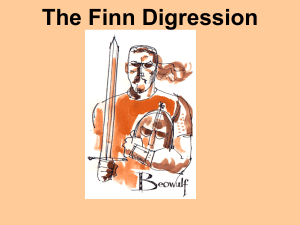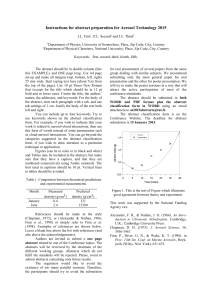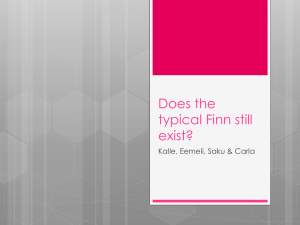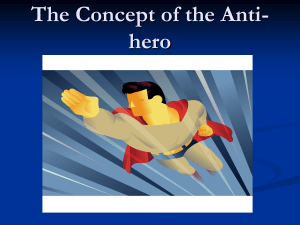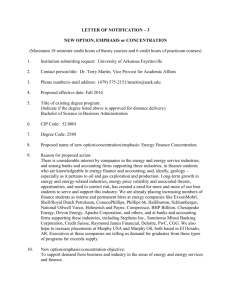Close Reading Essay Assignment: Literary Analysis
advertisement
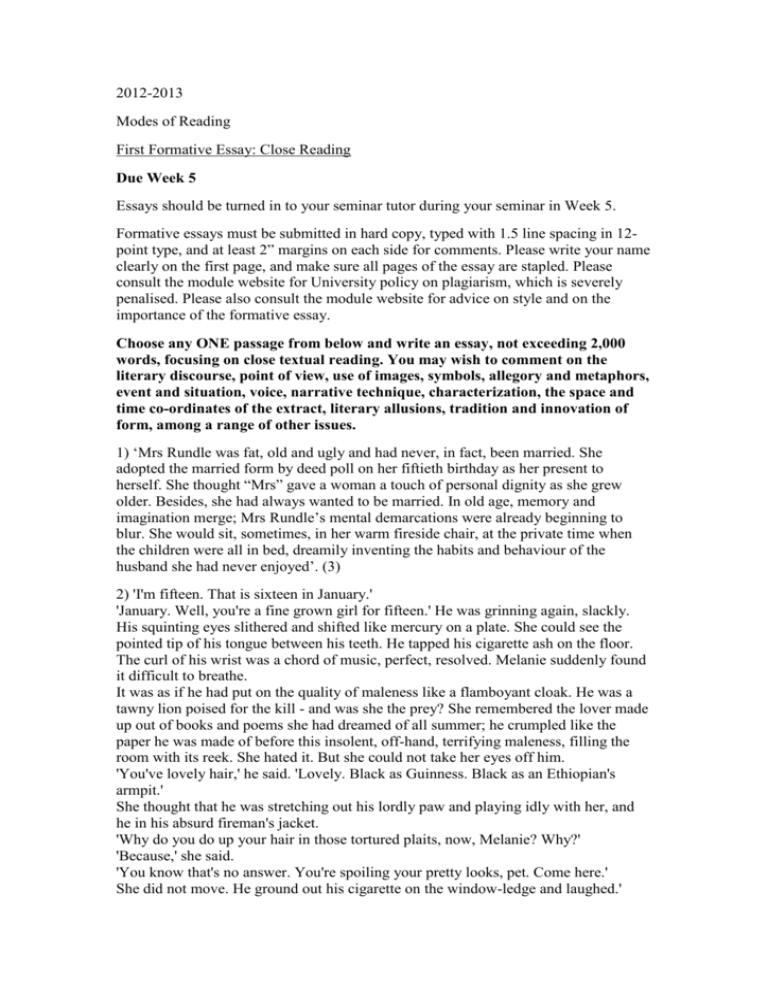
2012-2013 Modes of Reading First Formative Essay: Close Reading Due Week 5 Essays should be turned in to your seminar tutor during your seminar in Week 5. Formative essays must be submitted in hard copy, typed with 1.5 line spacing in 12point type, and at least 2” margins on each side for comments. Please write your name clearly on the first page, and make sure all pages of the essay are stapled. Please consult the module website for University policy on plagiarism, which is severely penalised. Please also consult the module website for advice on style and on the importance of the formative essay. Choose any ONE passage from below and write an essay, not exceeding 2,000 words, focusing on close textual reading. You may wish to comment on the literary discourse, point of view, use of images, symbols, allegory and metaphors, event and situation, voice, narrative technique, characterization, the space and time co-ordinates of the extract, literary allusions, tradition and innovation of form, among a range of other issues. 1) ‘Mrs Rundle was fat, old and ugly and had never, in fact, been married. She adopted the married form by deed poll on her fiftieth birthday as her present to herself. She thought “Mrs” gave a woman a touch of personal dignity as she grew older. Besides, she had always wanted to be married. In old age, memory and imagination merge; Mrs Rundle’s mental demarcations were already beginning to blur. She would sit, sometimes, in her warm fireside chair, at the private time when the children were all in bed, dreamily inventing the habits and behaviour of the husband she had never enjoyed’. (3) 2) 'I'm fifteen. That is sixteen in January.' 'January. Well, you're a fine grown girl for fifteen.' He was grinning again, slackly. His squinting eyes slithered and shifted like mercury on a plate. She could see the pointed tip of his tongue between his teeth. He tapped his cigarette ash on the floor. The curl of his wrist was a chord of music, perfect, resolved. Melanie suddenly found it difficult to breathe. It was as if he had put on the quality of maleness like a flamboyant cloak. He was a tawny lion poised for the kill - and was she the prey? She remembered the lover made up out of books and poems she had dreamed of all summer; he crumpled like the paper he was made of before this insolent, off-hand, terrifying maleness, filling the room with its reek. She hated it. But she could not take her eyes off him. 'You've lovely hair,' he said. 'Lovely. Black as Guinness. Black as an Ethiopian's armpit.' She thought that he was stretching out his lordly paw and playing idly with her, and he in his absurd fireman's jacket. 'Why do you do up your hair in those tortured plaits, now, Melanie? Why?' 'Because,' she said. 'You know that's no answer. You're spoiling your pretty looks, pet. Come here.' She did not move. He ground out his cigarette on the window-ledge and laughed.' 'Come here,' he said again, softly. So she went. He put his hands on her shoulders and inspected her face closely; nodded as if he approved of it and began to unfasten her hair. Burning, she held her breath. She had never been so close to a young man before. The smell of paint fought with his body smell and won; it was almost overpowering. He shook out her hair for her. Took his own comb from his pocket (a gap-toothed, black comb, threaded with red hairs) and combed it out. He concentrated. He had, she saw, stopped playing with her. The atmosphere around him had changed, grew less charged, grew ordinary. He was simply doing her hair, fluffing it out like a real hairdresser. For secret reasons she acknowledged but didn't understand, she felt bitterly offended.' (45-6) 3) The house was entirely quiet. Melanie decided to adventure downstairs to the kitchen, where she had not been. She wanted to learn the new domestic geography as soon as she could, to find out what lay behind all the doors and how to light the stove and whereabouts the dog slept. To make herself at home. She had to make herself at home, somehow. She could not bear to feel such a stranger, so alien, and somehow so insecure in her own personality, as if she found herself hard to recognise in those new surroundings. She crept down the lino-covered stairs. The kitchen was quite dark because the blinds were drawn. There was a smell of stale cigarette smoke and some unwashed cups were stacked neatly in the sink, but the room was ferociously clean. It was quite a big room. There was a built-in dresser, painted dark brown, loaded with crockery, a flour jar, a bread-bin. There was a larder you could walk into. Melanie experimentally walked into it and pulled the door to on herself in a cool smell of cheese and mildew. What did they eat? Tins of things; they seemed particularly fond of tinned peaches, there was a whole stack of tins of peaches. Tinned beans, tinned sardines. Aunt Margaret must buy tins in bulk. There were a number of cake tins and Melanie opened one and found last night’s currant cake. She took a ready-cut slice of it and ate it. It made her feel more at home, already, to steal something from the larder. She went back into the kitchen, scattering crumbs. There was a long table of scrubbed pine with a tablecloth (splashed with russet chrysanthemums, the sort of tablecloth you see through the windows of other people’s houses as you walk by at teatime) folded back to cover crockery set out ready for breakfast, perhaps to keep mice from dirtying the cups. It was a brown room, like the shop and the passages, which were all painted a thick, dark brown. The kitchen wallpaper was old and brown and shiny and streaky with grease. There was another blackboard on the wall and on it the legend: ‘Arrived on time. Fast asleep.’ Uncle Philip must have come back so late at night or early in the morning that only Aunt Margaret was still awake. Melanie tried to reconstruct his return, Aunt Margaret making tea, he asking after the new comers and she telling him in her own. He wore his Mississippi gambler’s outfit. But she could not visualise his face clearly. The room was full of other people’s unknown lives. A scorchmark on the cloth that had its own secret history, mysterious unopened mail behind a small plaster model of an Alsatian dog on the mantelpiece (which was a modern, ugly mantelpiece made of beige tiles). The fireplace itself was obviously never used; there was a fan of newspaper where the sticks and coal should be. (65-66) 4) She looked at it idly at first and then with increasing curiosity. A hole in the wall, through which light shone from the next room. A neat, round hole. Finally, she got up and knelt by the hole, which was the size of a penny. Remembering the first night, when she watched the Jowles through the kitchen keyhole, she thought that she was always spying on them. Now she saw the terra incognita of the brothers’ bedroom, lit by an un-shaded central lamp. Two small white beds, the sheets turned down over quilted satin eiderdowns. A black and brown rug on the floor, a very cheap one. A wooden chair painted with castles and roses, like a barge. That would be Finn’s chair. A square of mirror propped against a pink-washed wall. Beside the mirror hung a painting. She squirmed around for a better view of it. It was a peculiar painting. She found it difficult to believe. Aunt Margaret sat on a bank of primroses, naked but for a cloak of brilliant green loosely slung around her shoulders. Her famine leanness was softened by all the scarlet hair drifting around her. Her pubic hair was a mound of fire. Her breasts were on the point of turning into roses. Her flesh was a glaring white. Finn must have used white paint raw from the tube unmixed with any other colour. Down her white cheeks rolled two fat tears which glistened because they were round, faceted, crystal beads stuck onto the canvas. Over her head was a florid, curling garland of curious flowers, tulips, auriculas and daffodils, tied with a green bow at each end. Two cupids clutched the bows and kicked fat heels. They were executed in low relief in pink Plasticine. The whole painting had a secret, private quality about it, the quality of a whisper behind the hand. It, too, must be an allegory, though not in the style of Rubens. Finn’s raincoat lay on the floor beside a fiddle case, shaped like the coffin of some dwarf. Then Finn himself crossed her field of vision. His hair brushed the splintery floorboards. He was walking on his hands. She could not be surprised any more. Walking on his hands, he made hardly any noise, only a carpet-slipper slapping of palms against the floor. She sat back and considered the evidence of the spy-hole. (108-109) 5) 'I buried the swan near the queen,' he said conversationally in this dimensionless voice he now had. 'Do you think that was kind of me? I suppose I thought they'd be company for one another.' 'Well,' she said, 'it is as good a place as any.' 'I'm not really sure why I went to the pleasure garden when I could have put the bits of the swan in the dustbin. But somehow it seemed best of all to bury it in the pleasure garden. Do you know, though, I was almost delirious in the pleasure garden? I was that bad, Melanie ... the stone lioness was tracking me. I was sure of it. I heard her growl. And the queen was upright on her pedestal. That gave me a turn, I must say. I saw her from a distance but she must have seen me coming and gone and lay down again quickly. She was lying down, all right, when I got up to her. The bitch. Also, very faintly, was a sound of someone playing concertina. That troubled me more than anything.' 'What music was he playing?' she asked. 'You're making fun of me,' he said reproachfully. 'No.' 'And I took this spade with me, to dig a grave for the swan, and kept dropping the spade. It kept slipping out of my fingers as if it didn't want to go with me. And the swan's neck refused to be chopped up; the axe bounced off it. It kept sticking itself out of my raincoat when I buttoned it up to hide it and it kept peering around while I was carrying it, along with all the bits of the swan and the spade as well. I had my arms full, I can tell you. It must have looked, to the passer-by, as if I was indecently exposing myself, when the swan's neck stuck out. I was embarrassed with myself and kept feeling to see if my fly was done up.' He went on and on talking. He was talking as freely as he used to do. More freely. 'You must have had a time of it, poor Finn.' It had been a bad day for them both. She felt that somehow their experience ran parallel. She understood his frenzy. 'Poor Finn.' 'Ah, but it was a pleasure to destroy the swan.' 'I wish that you hadn't.' 'It covered you,' said Finn. 'It rode you. I did it partly for your sake, because it rode you.' 'It didn't hurt me.' 'Besides, Philip Flower loved it so.' 'What will happen?' 'I can't tell,' he said. 'Only surmise.' They were peaceful in bed as two married people who had laid in bed easily together all their lives. It seemed the most normal thing in the world to be sharing a pillow with Finn, but, when she closed her eyes again, Melanie was inside the white igloo of the swan's wings. The swan was too big, too potent, to all at once stop being. 'It was a ludicrous thing, the swan,' she said. 'But so much work went into it.' 'He put himself into it. That is why it had to go. Oh, I'm weary.' 'Go to sleep, then.' 'It will flop through the window to haunt me.' 'No, it won't, stupid.' 'You are sharp with me,' he protested. 'That's because I'm sensible.' 'Maybe.' 'Take your socks off, Finn. They're wet. You'll catch cold.' There was a small earthquake in the bed as he obeyed her. (172-4) 6) Their shared past sprang up between them, tangible, their years together, their own old home, their parents. The woman in the brothers’ bedroom, their mother. What was her name? How had she talked to them and showed them how she loved them and what family names, little names, did she have for them? How had she died? Did they get their red hair from her or what colour had her hair been? And how had she worn it? All Melanie knew of her was her guarded face and the feel of her dead eyelids, transmitted to her fingertips from Francie through Finn. Melanie wanted all their past, every bit of it, to share. She wanted to know when Francie had started to play the fiddle and who had first given Finn a set of paints. And how had Aunt Margaret met Uncle Philip; what doomsday had that been? And their father, who was he? Everything, family jokes and their parents’ love-letters before they were married (if their parents had exchanged love-letters) and cut locks of treasured hair and clippings of birth announcements from yellowed old local newspapers. She felt she would die if she could not know everything. ‘What was your mother like?’ she said to Finn, as a beginning. ‘Like a mother.’ (190-1) 7) `The skylight,' said Finn, who was pale but calm, as if all this had been rehearsed somewhere a long time ago. 'We'll go on the roof.' The crackling noise was now all around them. Uncle Philip might have been roasting a herd of pigs. 'With all that wood in the basement, the place will go upin no time. We must hurry.' One of the sinister doors of Bluebeard's castle sprang open as they went by. Francie came out, carrying an iron bar. 'Good luck,' said Finn. 'Oh, take care!' said Melanie. 'God bless you,' said Francie. He was in his shirtsleeves. There were black rings of sweat under his arms. He went downstairs and they went up. Finn hoisted Melanie through the skylight and swung up himself, onto the high and windy roof, with the first stars and the chimney pots. They rested for a while. Sally go round the stars, Sally go round the moon, Sally go round the chimney pot On a Sunday afternoon. Wheeeeeeee! When she was a very small girl, her father recited this to Melanie, and, when he came to the 'Wheeeeeeee!' bit. seized her round the waist and whirled her up in the air. She and Finn sat whirled among the chimney pots and held hands. Melanie thought : 'Now we have shared all this, we can never be like other people. We can only be like ourselves and one another. We have only each other, now.' She said aloud : 'I have already lost everything, once.' `So have I,' said Finn. 'But then I had my brother and sister left to me. Where is Jonathon?' 'I don't know. If you've got your breath back, Melanie. we must go on. There is a fire escape on the next house and we can get across the roof easily.' It was the deserted jeweller's. The rusty metal treads clanged beneath their feet. The rooms above the shop were empty but might soon be full of fire. In a few seconds, they stood knee-high in the grass of the neglected garden. It was full of discarded tins, jam-jars, rubbish thrown over the wall. 'We must ring the brigade. 999. Fire. Ambulance,' said Finn. 'Police. Help for us.' The house burnt like a giant chrysanthemum, all golden. 'But then,' said Finn, almost to himself, 'I expect somebody has rung 999 already. Windows opened around them on all sides and anxious heads poked out, chorusing agitation. It was night. The house jetted flames. A man standing in the alley a few feet away from them said lugubriously: 'There can be nothing left alive in there.' `Do you think they are all burnt up?' Melanie said to Finn. 'I think Francie and Maggie and the baby are safe. And the dog is an old dog and knows many tricks.' 'You don't think so. You only hope so. And the poor talking bird ...' 'Poor Joey,' said Finn. 'Philip bought him.' They watched the flames. 'My jacket,' said Finn with a choked half laugh, half sob. 'It is ironic under the circumstances, a fireman's jacket.' 'I often wondered where you got it.' `Just at a jumble sale.' 'Oh.' A floor caved in inside the house with a gush of fire. All burning, everything burning, toys and puppets and masks and chairs and tables and carpets and Mrs Rundle's Christmas card with all her love and lightshades bursting open with fire and the bathroom geyser melting and the bathroom plastic curtains dripping to nothing as the fire licked them over. Edward Bear burning, with her pyjamas in his stomach. 'All my paintings,' said Finn faintly. 'Such as they were.' 'Even Edward Bear,' she said. 'What?' 'My bear. He's gone. Everything is gone.' 'Nothing is left but us.' At night, in the garden, they faced each other in a wild surmise.
